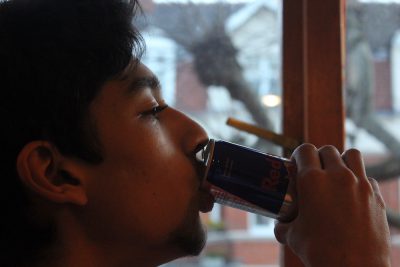
Over the past few months stores such as Waitrose, Asda, and Aldi have banned the sale of high-caffeine energy drinks to children under 16. Some of these drinks include Red Bull, Monster and Rockstar. This decision was made “in response to growing concern about the consumption of energy drinks among young people,” said managing director of corporate responsibility at Aldi in an interview with the BBC. While these stores want to make money, they realize that by not selling these to young kids, they are decreasing the amount of caffeine teenagers put into their body.
The banning of these energy drinks has an effect on kids in the middle school at ASL. While Seventh grader Nathan Lewis doesn’t think it is right to ban these drinks because caffeine has not affected him in a negative way, according to Healthline, which is a privately owned provider of health information, it does. Some side effects of drinking too much caffeine include jitteriness, nervousness, headaches, increased blood pressure and in some cases could stunt your growth. However Lewis hasn’t experienced any of these negative side effects. “I drink energy drinks often, like before sports games. I drink it to give me energy. I have never thought about it affecting my growth or giving me headaches. I just want to have energy for big games.”
In a recent study by the New York Times, research shows that adolescence (13-16), should have no more than 100 mg of caffeine a day or else it can interfere with sleep. In 8 oz of coffee, there is around an average of 95-200 mg which shows that kids who drink over 2 cups of coffee a day could experience some of the negative effects. Similar to coffee, one can of Red Bull contains 80 mg of caffeine.
Just like Lewis, seventh grader Javi McGowan thinks that banning these kinds of energy drinks to kids under the age of 16 is not right. Although he doesn’t drink them that often, he has not been affected by these kinds of drinks and sees no reason to ban them. “I don’t see any harm with these drinks. They haven’t affected me physically or mentally so I think they should get rid of this ban.”
McGowan enjoys drinking energy drinks in his recreational time because he likes the flavors and the taste of these drinks.
While studies from the BMJ (British Medical Journal) shows that energy drinks contribute to sugar intake and sugar intake is linked to the development of obesity and various types of cancer, as well as type 2 diabetes and is rotting children’s teeth, Lewis and McGowan have not been affected by this and want the stores to get rid of the ban because they enjoy these drinks.
One solution could be drinking one energy drink every few days, like Lewis and McGowan and this can lead to fewer kids experiencing growth problems and other serious side effects. However, since kids are consuming too much caffeine, stores in the U.K. have chosen to ban these drinks.
